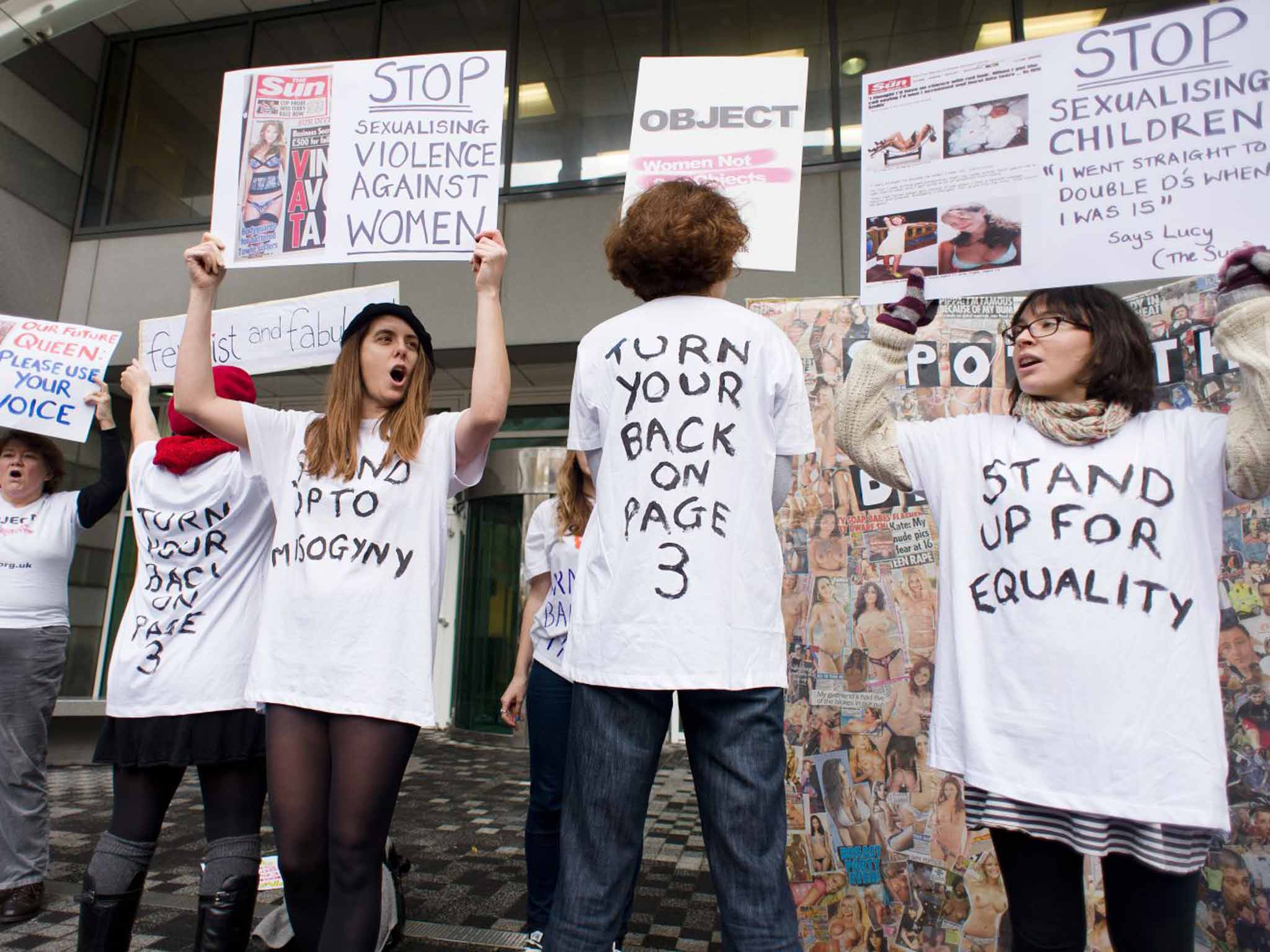No More Page 3: Our grassroots campaign took on a huge corporation, and we won
Slaying this leviathan has left ripples and we don’t know where they’ll end up

Your support helps us to tell the story
From reproductive rights to climate change to Big Tech, The Independent is on the ground when the story is developing. Whether it's investigating the financials of Elon Musk's pro-Trump PAC or producing our latest documentary, 'The A Word', which shines a light on the American women fighting for reproductive rights, we know how important it is to parse out the facts from the messaging.
At such a critical moment in US history, we need reporters on the ground. Your donation allows us to keep sending journalists to speak to both sides of the story.
The Independent is trusted by Americans across the entire political spectrum. And unlike many other quality news outlets, we choose not to lock Americans out of our reporting and analysis with paywalls. We believe quality journalism should be available to everyone, paid for by those who can afford it.
Your support makes all the difference.In 2012, Lucy-Anne Holmes wrote a letter to the then-editor of The Sun, politely requesting that the newspaper reconsider Page 3, detailing some of the reasons why sexually objectifying women in a newspaper was simply not sensible. Receiving no answer, she started a petition – and, 217,000 signatures later, we campaigners at No More Page 3 finally have our reply. Though not exactly a direct one.
After an evening of rumours and speculation about the demise of Page 3, yesterday morning we woke up to the news that, after two and a half years of campaigning, No More Page 3 was no longer a request but a statement. The Sun newspaper, by all accounts, had quietly withdrawn its 44-year-old feature. No longer will the third page of the most widely sold newspaper in the UK be dominated by a topless young woman – and this marks a massive step for The Sun, whose editor David Dinsmore affirmed its commitment to Page 3 upon his appointment only a year and a half ago.
Page 3 is - was - a symbol of a society unable to come to terms with its own sexism. Introduced in the seventies, Page 3 endured as though stuck in a sexist time-warp – sexualised images of women being used to decorate news stories both featuring and aimed at men.
We’ve been feeling somewhat stunned since we heard first the news. From disbelief, to hope, to confusion, to the strange, paranoid notion that it was all a vast cosmic joke. After all those months of campaigning, it seemed unbelievable that The Sun could have actually stopped featuring topless models alongside the news of the day. This “British institution”, this pinnacle of media sexism, had toppled.
Now, The Sun hasn’t suddenly stopped being sexist – we hadn’t expected it to. Their first alternative to Tuesday’s Page 3 was a photograph of bikini-clad celebrities on a beach, and they weren't reporting a world-changing swimming competition. The mere fact that the women pictured on Page 3 are wearing bikini tops does not magically stop the feature being sexist – far from it. Thus far, The Sun have continued to portray women as primarily decorative sexual objects. British society in general hasn’t suddenly achieved gender equality.
And yet – there has been a change. Page 3 has been so long embedded as part of our culture that, despite the efforts of earlier campaigners, it has remained largely unquestioned. It’s been seen as the way things are. Yet the dedicated efforts of hundreds of campaigners have brought the No More Page 3 campaign into prominence – starting conversations about the media representation of women, and just what that highlights about our society. These conversations haven’t stopped. Indeed, many are just beginning, as people around the world get drawn into the Page 3 debate.
Yesterday, I got a message from a friend in Paris, telling me she’d heard about No More Page 3’s success on French radio. Today, I’ll got up at 5am for a live interview in Australia. People are talking about the fact that a grassroots campaign took on a huge corporation and won. And sure, it’s only been a battle – there’ll be many, many more. Yet this change will bring more change. Slaying this leviathan has left ripples and we don’t know where they’ll end up.
For now, we’re happy, and tired. Once the hubbub of these few days is over, we’ll rest. Then, we’ll celebrate. And then, we’ll organise. We’ve a long way to go in achieving better media representation for all genders – but, with no more Page 3, we’ve made a start.
Join our commenting forum
Join thought-provoking conversations, follow other Independent readers and see their replies
Comments